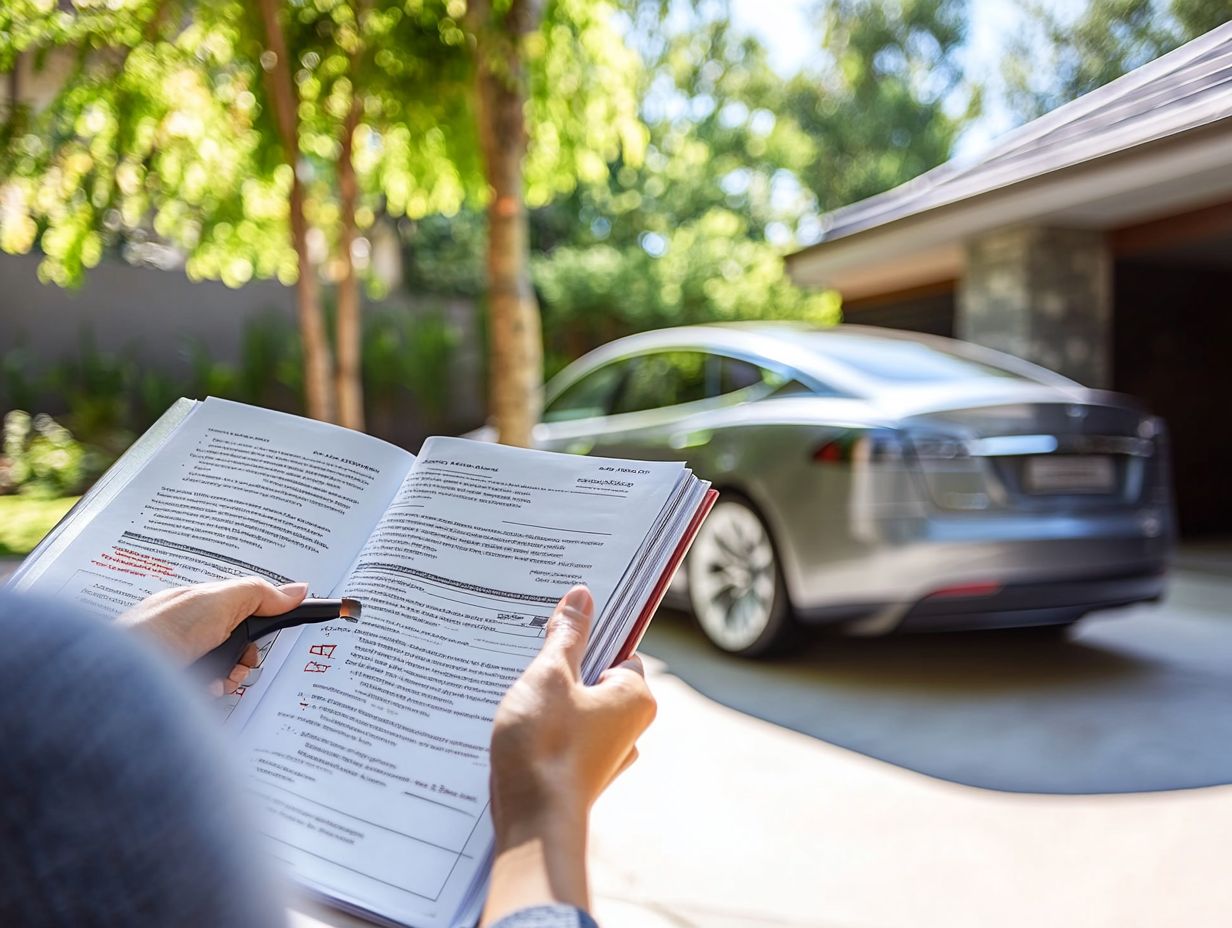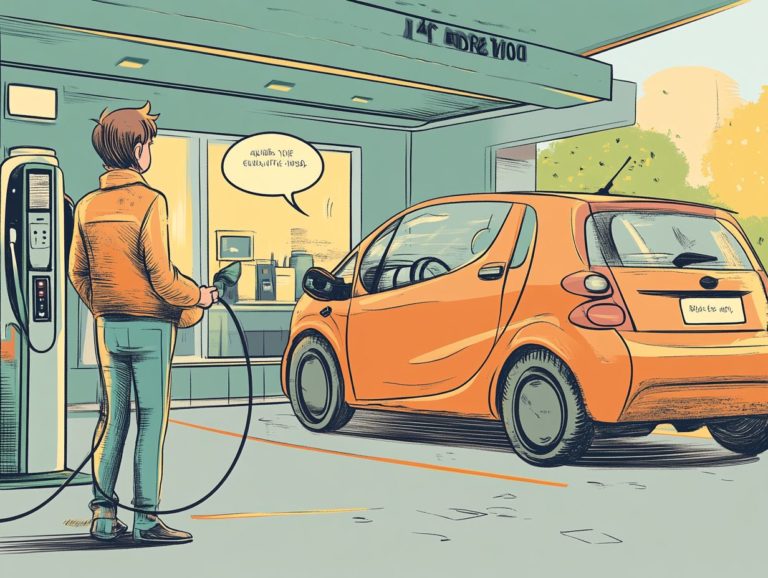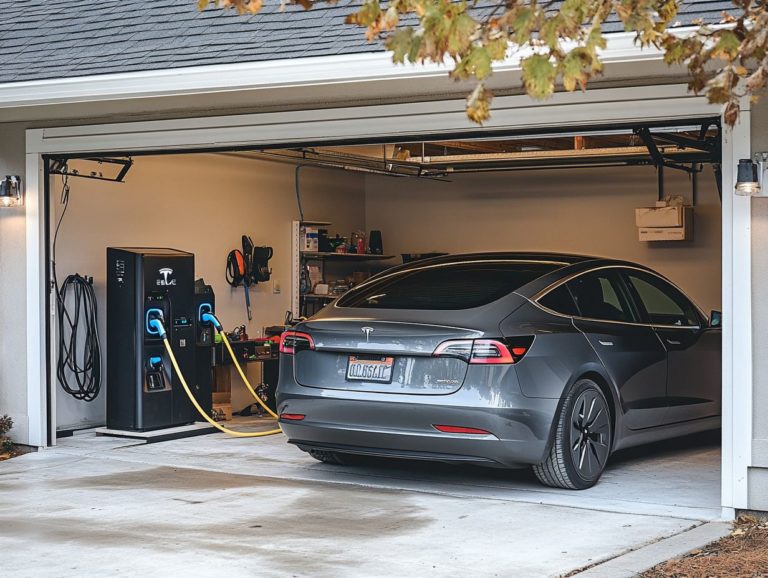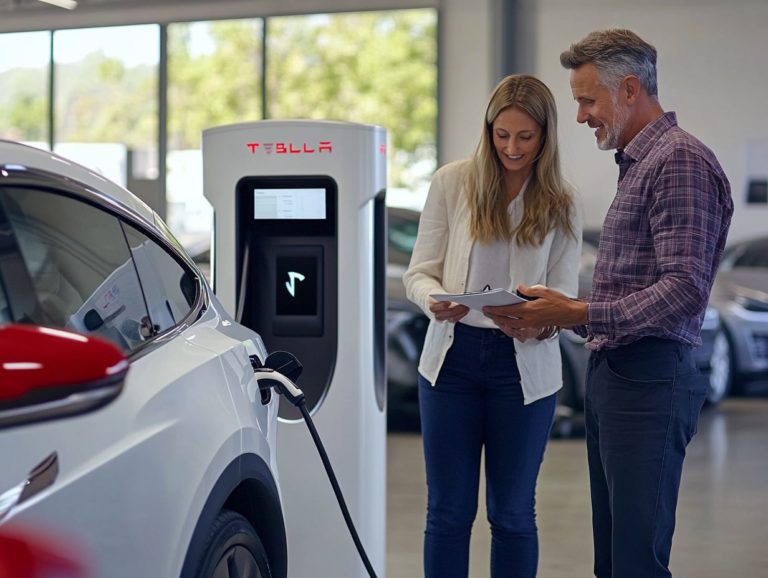what do i need to know about ev warranties?
Electric vehicles (EVs) mark a transformative shift in transportation. As an owner, it’s essential to understand their warranties.
This article provides a breakdown of what an EV warranty encompasses and delves into the various types available. You will discover which components are covered, the duration of the warranty, and critical factors to weigh when deciding between manufacturer and third-party options.
We will debunk common myths about EV warranties. This information will help you make the best decision for your investment.
Contents
- Key Takeaways:
- Understanding EV Warranties
- What is Covered in an EV Warranty?
- Factors to Consider When Choosing an EV Warranty
- Making the Most of Your EV Warranty
- Common Misconceptions About EV Warranties
- Frequently Asked Questions
- 1. What do I need to know about EV warranties?
- 2. What is typically covered under an EV warranty?
- 3. Are EV warranties different from traditional car warranties?
- 4. Are there any conditions or limitations to EV warranties?
- 5. Is it possible to extend an EV warranty?
- 6. What should I do if I have a problem covered under my EV warranty?
Key Takeaways:

EV warranties cover specific components and parts for a set amount of time, providing peace of mind and potential cost savings for owners.
When choosing an EV warranty, consider factors like the type of warranty, cost, and coverage options. Make sure to understand the terms and conditions.
To maximize your EV warranty, regularly maintain and inspect your vehicle and understand any misconceptions or myths surrounding EV warranties.
Understanding EV Warranties
As an electric vehicle owner, knowing about EV warranties is crucial for your peace of mind! These warranties offer vital protections for your investment in cutting-edge models like Tesla, Kia, Hyundai, Volkswagen, Ford, BMW, Lucid, and Rivian.
Buying an electric vehicle can feel overwhelming. The unique components and technologies make understanding warranties challenging. From basic warranty protections to specialized coverage for the high-voltage battery and the parts that make the vehicle move, it’s crucial to comprehend the warranty terms and their implications for your overall EV ownership experience. Additionally, it’s important to learn about what you should know about EV tax credits to maximize your investment.
What is an EV Warranty?
An EV warranty is a specialized vehicle warranty tailored for electric vehicles. It encompasses various components such as the battery, the parts that make the vehicle move, and fundamental vehicle functions.
This dedicated warranty acts as your protective shield against potential defects and repairs linked to electric vehicle technology, which diverges significantly from traditional internal combustion engine vehicles.
Unlike conventional warranties, EV warranties often offer extensive coverage for crucial parts, particularly the battery pack typically the priciest component while also safeguarding against performance issues over time.
Manufacturers generally provide a range of coverage options, from basic to extended plans, which may include perks like roadside assistance.
As the electric vehicle market continues to grow, grasping the intricacies of these warranties is essential for consumers looking to secure peace of mind in their investment.
Types of EV Warranties
You’ll find various options designed to suit specific needs, such as battery warranties, powertrain warranties, basic warranties, and vehicle service contracts. Understanding these choices, including what you should know about EV battery recycling, is crucial for any EV owner.
Battery warranties protect you against issues with the vehicle’s battery pack, typically covering the reduction in battery performance over time and offering protection for eight years or approximately 100,000 miles.
Meanwhile, powertrain warranties focus on the core components that keep your vehicle running smoothly, like the electric motor and transmission. This ensures peace of mind against mechanical failures.
Basic warranties cover a broader range of systems but usually have a shorter duration. On the flip side, vehicle service contracts provide extra protection for various components, though they may exclude routine maintenance or certain wear-and-tear items.
Familiarizing yourself with the fine print can save you from unexpected repair costs down the line.
What is Covered in an EV Warranty?
EV warranties encompass a wide array of essential components and parts vital to the operation and reliability of electric vehicles. This protection ensures that you are shielded from high repair costs and unforeseen issues that may arise during the warranty period.
Components and Parts Covered

The components and parts covered by an EV warranty generally include the big battery that powers your EV, the system that helps your car move, and other essential systems that set electric vehicles apart from traditional cars. These parts are crucial for the overall performance and reliability of electric vehicles, ensuring they operate efficiently and last a long time.
Take the big battery, for example it’s the heart of your EV. It stores energy and directly affects your range and charging times. Brands like Tesla offer extensive battery warranties, often covering 8 years or more. This shows their commitment to reliability.
Kia and Ford offer various coverage options and durations, showcasing their different philosophies on EV technology and customer assurance. By understanding these differences, you can make informed decisions about the long-term benefits of EV warranties compared to traditional car warranties.
Length of Coverage
The length of coverage for an EV warranty varies widely among brands. Many offer extended warranty periods and mileage limits tailored for electric vehicle owners.
For instance, Hyundai provides a fantastic choice for buyers, covering their EVs for up to 10 years or 100,000 miles.
Newer companies like Rivian offer warranty terms covering 5 years or 60,000 miles, showing their commitment to customer assurance but with different parameters than established brands.
These mileage limits can significantly impact you as an owner; exceeding them might result in costly repairs without warranty support. Knowing these differences helps you as a buyer to make informed decisions about the longevity and reliability of your electric vehicle investment.
Factors to Consider When Choosing an EV Warranty
When selecting an EV warranty, consider several important factors. Compare manufacturer warranties with third-party options, focusing on the cost and coverage available to you as a potential electric vehicle owner.
Manufacturer vs. Third-Party Warranties
Choosing between manufacturer and third-party warranties is a crucial decision for you as an EV owner. Each option has unique advantages regarding warranty protections, coverage specifics, and overall reliability.
When considering premium brands like Lucid and Audi e-tron, it s vital to understand how their warranties meet your needs. Manufacturer warranties often provide strong coverage, especially for essential components like the battery an aspect that matters to EV enthusiasts.
Third-party warranties may offer more flexible terms, but their reliability and coverage can vary greatly. This makes it essential for you to review the fine print.
By weighing the pros and cons of each warranty type, you can make informed choices that enhance your overall ownership experience as an EV driver.
Cost and Coverage Options
The cost of EV warranties can vary significantly based on the coverage options you select. It s essential to assess your needs and budget before making a decision.
With choices ranging from basic powertrain coverage to comprehensive plans that protect against many potential issues, knowing these layers of protection is vital. Comprehensive coverage usually provides greater peace of mind but may come with a higher price tag.
On the other hand, vehicle service contracts can provide customized solutions that focus on specific components of your electric vehicle.
By weighing the advantages and costs associated with different warranty packages, you can navigate the financial landscape more effectively, ensuring your investment in an EV remains protected and cost-effective over time.
Be sure to explore all your options before you buy!
Making the Most of Your EV Warranty

To maximize the benefits of your EV warranty, it s crucial for you to engage in routine maintenance and inspections. Act now to protect your investment and enjoy peace of mind!
Equally important is familiarizing yourself with the warranty terms and conditions that outline coverage and any limitations. This proactive approach ensures you protect your investment.
Regular Maintenance and Inspections
Regular maintenance and inspections are vital for EV owners. They help your vehicle stay in peak condition and meet warranty requirements.
For those with electric vehicles, it’s crucial to prioritize maintenance services tailored to your unique technology. This includes regularly checking the battery management system, which monitors battery health and efficiency key factors in extending its lifespan.
Timely software updates enhance performance and security, allowing your vehicle to operate smoothly. Overlooking these critical checks can lead to performance hiccups and may even void your warranty. This underscores the importance of adhering to a maintenance schedule.
Stay proactive! Enjoy a smoother ride and increased reliability from your eco-friendly vehicle.
Understanding Warranty Terms and Conditions
Understanding warranty terms and conditions is essential for EV owners. The fine print holds critical information about exclusions and coverage limitations.
Familiarizing yourself with these stipulations can save you from unexpected expenses and help you make informed decisions throughout your vehicle’s lifespan. This includes policies on battery replacements, which can be costly but are often necessary for optimal EV performance.
You should also be aware of specific scenarios that could void your warranty, such as unauthorized repairs or modifications, which can lead to costly fixes that won t be covered. By grasping these details, you can safeguard your investment and fully enjoy the benefits of your EV.
Common Misconceptions About EV Warranties
You might encounter several common misconceptions about EV warranties that can create confusion as you navigate the world of electric vehicle ownership.
It’s crucial to separate fact from fiction. Empower yourself to make informed decisions that align with your needs.
Debunking Myths and Understanding the Truth
Debunking myths about EV warranties is crucial for you as a prospective owner. Understanding the facts empowers you to make more informed decisions regarding warranty options and protections.
Many people mistakenly think that electric vehicles come with limited warranty coverage, especially concerning their powertrains and batteries. This misconception might hold you back from considering an EV, driven by concerns over potential repair costs.
In truth, most manufacturers provide comprehensive warranties that typically cover battery components for eight years or up to 100,000 miles. By understanding the durability and extent of EV warranties, you can approach your choice with greater confidence, secure in the knowledge that you’re safeguarded against significant battery degradation and unexpected powertrain issues.
Frequently Asked Questions

1. What do I need to know about EV warranties?
Electric vehicle (EV) warranties cover the repair or replacement of certain components in your EV for a specific period or mileage.
2. What is typically covered under an EV warranty?
Most EV warranties cover the electric motor, battery, and other key components, as well as defects in materials and workmanship.
3. Are EV warranties different from traditional car warranties?
Yes, EV warranties typically have longer coverage periods for the electric powertrain (usually 8 years/100,000 miles) compared to traditional car warranties.
4. Are there any conditions or limitations to EV warranties?
Yes, EV warranties may have specific conditions or limitations, such as regular maintenance requirements or voiding the warranty if the vehicle is modified or used for commercial purposes.
5. Is it possible to extend an EV warranty?
Absolutely! Many manufacturers provide fantastic extended warranty plans for EVs. These plans can give you extra coverage beyond the standard warranty.
6. What should I do if I have a problem covered under my EV warranty?
If you face an issue with your EV that s covered under warranty, reach out to your manufacturer or a certified car shop. Make sure you have all your paperwork ready and follow their instructions carefully.






